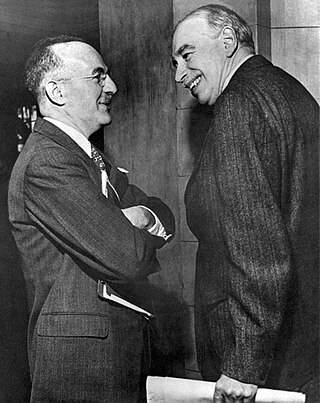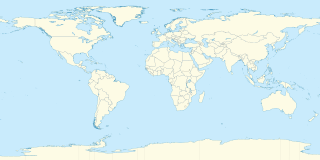
The World Trade Organization (WTO) is an intergovernmental organization headquartered in Geneva, Switzerland that regulates and facilitates international trade. Governments use the organization to establish, revise, and enforce the rules that govern international trade in cooperation with the United Nations System. The WTO is the world's largest international economic organization, with 166 members representing over 98% of global trade and global GDP.
The Uruguay Round was the 8th round of multilateral trade negotiations (MTN) conducted within the framework of the General Agreement on Tariffs and Trade (GATT), spanning from 1986 to 1993 and embracing 123 countries as "contracting parties". The Round led to the creation of the World Trade Organization, with GATT remaining as an integral part of the WTO agreements. The broad mandate of the Round had been to extend GATT trade rules to areas previously exempted as too difficult to liberalize and increasingly important new areas previously not included. The Round came into effect in 1995 with deadlines ending in 2000 under the administrative direction of the newly created World Trade Organization (WTO).
The Doha Development Round or Doha Development Agenda (DDA) is the trade-negotiation round of the World Trade Organization (WTO) which commenced in November 2001 under then director-general Mike Moore. Its objective was to lower trade barriers around the world, and thus increase global trade.
A free trade agreement (FTA) or treaty is an agreement according to international law to form a free-trade area between the cooperating states. There are two types of trade agreements: bilateral and multilateral. Bilateral trade agreements occur when two countries agree to loosen trade restrictions between the two of them, generally to expand business opportunities. Multilateral trade agreements are agreements among three or more countries, and are the most difficult to negotiate and agree.
The Sixth Ministerial Conference of the World Trade Organization, also known as the WTO Hong Kong Ministerial Conference and abbreviated as MC6, was held at the Hong Kong Convention and Exhibition Centre, Wan Chai, Hong Kong from 13 to 18 December 2005. Representatives from 148 countries were expected to attend the event, as well as over 10,000 protesters led by the Hong Kong People’s Alliance on WTO and made up of largely South Korean farmers. The conference approved a declaration which many participants described as marking "significant progress". However, due to violent protesters, police officers were deployed with batons, riot gas, and other non-lethal weapons. Around 910 people were arrested. Of these, 14 were charged, but none were convicted.
The Fourth Ministerial Conference of the World Trade Organization, also known as the WTO Fourth Ministerial Conference or MC4, was held at the Sheraton Doha Hotel and Resort, Doha, Qatar from November 9–13, 2001. At this conference, ministers from all WTO members launched the Doha Development Agenda.
The Agreement on Agriculture (AoA) is an international treaty of the World Trade Organization. It was negotiated during the Uruguay Round of the General Agreement on Tariffs and Trade, and entered into force with the establishment of the WTO on 1 January 1995.

The WTO Ministerial Conference of 1999 was the third Ministerial-level meeting of the World Trade Organization, convened at the Washington State Convention and Trade Center in Seattle, Washington, USA, over the course of four days, from Tuesday, 30 November 1999 to Friday, 3 December 1999. Anti-globalization activists organized large-scale protests of the meeting, sometimes known as the Battle of Seattle. Direct action tactics forced the WTO Ministerial Conference to begin late on 30 November and contributed to the meeting ending without agreement on 3 December.
This is a timeline of the World Trade Organization (WTO).
At the World Trade Organization Ministerial Conference of 2003, trade ministers from 146 members of the World Trade Organization (WTO), representing 93 percent of global commerce, convened in Cancún, Mexico, in September 2003. The conference was held at the Cancún Centro de Convenciones, Cancún. The goal of this meeting was to set a direction for nations within the WTO to negotiate agreements on agriculture, non-agricultural market access, services, and special treatment for developing countries. The negotiations were supposed to be completed by January 1, 2005. Although the agreements had a set date to come to terms, the Cancun Ministerial Conference ended up failing in its mission and did not come to any firm decisions to fix the problems it sought to address. Participants failed to make global trade negotiations concrete and foundered at that time, so the next steps were uncertain. However, attempts were made afterwards to learn from this failure. Within the committee, there exists a hierarchy within the World Trade Organization. It is made up of trade Administrators that come from all the different sectors of the WTO.
The Ministerial Conference is the top decision making body of the World Trade Organization (WTO). There have been thirteen ministerial conferences from 1996 to 2024, usually every two years.
Non-violation nullification of benefits (NVNB) claims are a species of dispute settlement in the World Trade Organization arising under World Trade Organization multilateral and bilateral trade agreements. NVNB claims are controversial in that they are widely perceived to promote the social vices of unpredictability and uncertainty in international trade law. Other commentators have described NVNB claims as potentially inserting corporate competition policy into the World Trade Organization Dispute Settlement Understanding (DSU).

The Asia-Pacific Trade Agreement (APTA), previously known as the Bangkok Agreement and renamed 2 November 2005, was signed in 1975. It is the oldest preferential trade agreement between countries in the Asia-Pacific region. The APTA market covers 2.7 billion people and accounted for US$15 trillion in terms of gross domestic product in Fiscal Year 2015–2016. APTA’s key objective is to hasten economic development among the seven participating states opting trade and investment liberalization measures that will contribute to intra-regional trade and economic strengthening through the coverage of merchandise goods and services, synchronized investment regime and free flow of technology transfer making all the Participating States to be in equally winsome situation. Its aim is to promote economic development and cooperation through the adoption of trade liberalization measures. APTA is open to all members of the United Nations Economic and Social Commission for Asia and the Pacific, which serves as the APTA Secretariat. Members of APTA are currently participating in the Fourth Round of Tariff Concessions, which are expected to conclude in October 2009.

Vangelis (Evangelos) Vitalis is a New Zealand diplomat and trade negotiator currently working as the Deputy Secretary for the country's Ministry of Foreign Affairs and Trade.
China became a member of the World Trade Organization (WTO) on 11 December 2001, after the agreement of the Ministerial Conference. The admission was preceded by a lengthy process of negotiations and required significant changes to the Chinese economy. Its membership has been contentious, with substantial economic and political effects on other countries and controversies over the mismatch between the WTO framework and China's economic model. Assessing and enforcing compliance has become issues in China-US trade relations, including how China's noncompliance creates benefits for its own economy.
The Bali Package is a trade agreement resulting from the Ninth Ministerial Conference of the World Trade Organization in Bali, Indonesia on 3–7 December 2013. It is aimed at lowering global trade barriers and is the first agreement reached through the WTO that is approved by all its members. The package forms part of the Doha Development Round, which started in 2001.
Afghanistan received membership to the World Trade Organization (WTO) at the 10th WTO Ministerial Conference in Nairobi, Kenya, December 17, 2015. Afghanistan is 164th in the world and 36th among the less-developed countries that have received WTO membership.

The World Trade Organization (WTO) is an intergovernmental organization which regulates international trade. The WTO officially commenced on 1 January 1995 under the Marrakesh Agreement, signed by 123 nations on 15 April 1994, replacing the General Agreement on Tariffs and Trade (GATT), which commenced in 1948. The WTO deals with regulation of trade between participating countries by providing a framework for negotiating trade agreements and a dispute resolution process aimed at enforcing participants' adherence to WTO agreements, which is signed by representatives of member governments and ratified by their parliaments. Most of the issues that the WTO focuses on derive from previous trade negotiations, especially from the Uruguay Round (1986–1994).
The Trade Facilitation Agreement (TFA), was confirmed in Bali, Indonesia in December 2013 at the Ninth Ministerial Conference. After almost 20 years of negotiations the agreement was officially an open invitation for acceptance from the 160 members of the World Trade Organisation (WTO) on 27 December 2014. However the agreement will only be ratified once 2/3 of the members have informed the WTO of their agreement. For the WTO, the agreement can be viewed as a historic achievement as it is the first multilateral agreement since the WTO's inception in 1995. The Trade Facilitation Agreement of 2014 is a global multilateral initiative to rationalise the stringent procedures which govern international trade. The principal focus of the Agreement is to have numerous positive consequences on developed and Least Developed Countries. Estimates have shown that the Trade Facilitation Agreement would reduce trade costs by an average of 14.5%. In turn, this would prospectively improve trade globally by on trillion dollars. This reduction of bureaucratic 'red tape' will have favourable effects on small to medium Businesses, making it easier for them to trade and join global value chains. One of the most significant aspects of this agreement, lies in the new principle that developing and Least Developed Countries commitments to the implementation of the provisions outlined by the agreement are conditioned on their procurement of necessary technical capacity.
The Twelfth Ministerial Conference (MC12) of the World Trade Organization (WTO) was a landmark event, marking the first Ministerial Conference held in nearly five years due to the COVID-19 pandemic. It brought together trade ministers and senior officials from all 164 WTO member countries to discuss and negotiate critical global trade issues.





